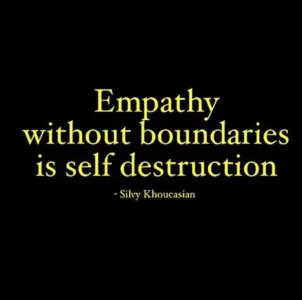Hi
@RestlessJohn and welcome to the forum.
I'm sure you appreciate that because you have only said a little about yourself and your wife any thoughts here are about INFJs in general, or about myself.
Something that INFJs do is internalise other people, particularly those close to us: we bring you inside us and relate to you there - in all your glory, but also faults and problems and all. It took me half a lifetime to learn how not to bring others in too far, and internalise their problems as well as my own, and it nearly broke me. We can easily get to the point where we can't separate our own problems from the other's. When we are young, we can feel unlimited internally and that we can cope with anything, but we are only finite like anyone else. We are even more prone to this when we are young adults if we have had emotional struggles because we feel and empathise deeply with the same in others quite instinctively.
It's a bit like when you pick up something that's hot, but not very - or something that's fairly heavy but not very. At first you can hold it OK, but it gets more and more uncomfortable until in the end you have to let go. You think it's OK, but eventually you find it's not. But when an INFJ gets into this situation with another's emotions it's a lot worse, because putting the burden down is a failure in several ways - because it means we risk having to face our own weakness, for example, but most seriously because it is letting the other person down so very badly, and this is a terrible thing for us to have to do. It's more serious than my words may seem to suggest, because we often become in our person an ongoing solution to another's problems - they rely on us to the extent that they may fall apart if we have to eject them from our inner selves.
It's doubly difficult when we have children, who we very much bring within ourselves, and who take up so much of our emotional energy. Do you have teenage children? - they are more demanding in this way at that age than at any other, and it can be hard and exhausting.
We INFJ folks have to learn the hard way how to deal with this - and sometimes that involves falling over an inner cliff that we weren't aware was there. We can have a breakdown at an extreme, or we can simply eject the other person from our lives and bring the shutters down. It's almost like pulling your hand away from a hot pan that you've grabbed by accident, or dropping something heavy that you realise has unexpectedly put your back out. Except that it feels like we've failed big time, even when that isn't our fault and not actually so, and it can be so hard for us to face that we can simply avoid it. And we can get stuck in an emotional doom loop, or just walk away.
So ..... what to do? You won't both be in the same situation as when I faced this in my 40s, and I'm the INFJ not my wife. Is it possible that you have been an emotional burden rather than a support for your wife for quite a time? She'll feel this even more as you try and mend the situation with ever increasing anxiety - she will be very aware of that anxiety most likely, and that will simply add to her emotional burden. She may even feel that you are looking for a rescue from her when she may not have the capacity to provide it.
But all of these are not hard suggestions - just possibilities.
What could help very possibly is for you to back off in the right kind of way and give her space - to be an emotional support rather than a burden. I have found myself that the way to love someone very close to us is
not to bring them into our inner souls, and if we do, we may have to push them outside our innermost boundary to love them properly. That can feel to them like a rejection, but it's not - by analogy, it's like not being obliged to carry them physically on our shoulders everywhere, which of course is no good for the INFJ person or their partner. I must emphasise that this is an INFJ subjective view - the other (yourself for example) may well see things very differently, and the actual situation may be very different again.
Perhaps you could try wooing her all over again, and try and give rather than take from her - give in a way suited to her rather than you? As
@TomasM suggests, a counselor may be a good help.

